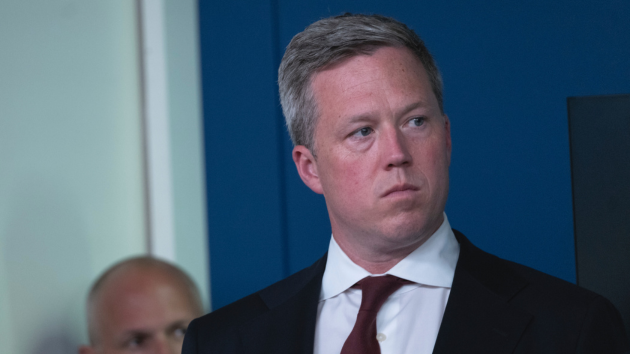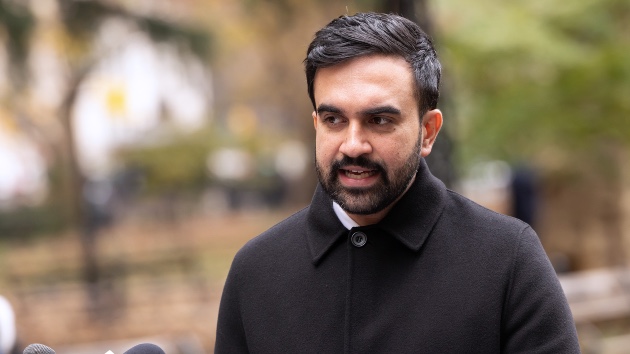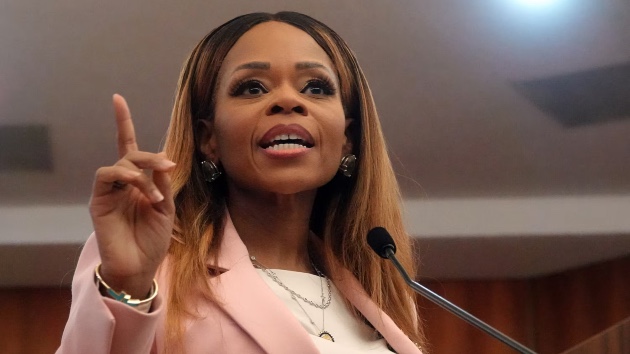Chef José Andrés says Israel’s ‘unforgivable’ strike on his aid workers must force ‘real reckoning’
Written by ABC AUDIO ALL RIGHTS RESERVED on April 7, 2024

The Israeli drone strike that killed seven workers with chef José Andrés’ aid group, World Central Kitchen, is something he will “have to live with” for the rest of his life, he said in an exclusive new interview with ABC News.
“It is unforgivable,” Andrés told “This Week” co-anchor Martha Raddatz in a sit-down that aired on Sunday. “I will forever have to live with this.”
The celebrated restaurateur-turned-humanitarian, who founded World Central Kitchen, or WCK, in 2010, argued that Israel has participated in misconduct in its war against Hamas that goes far beyond the strike on his group, which Israeli officials have called a “terrible” mistake.
“This is not anymore about the seven men and women of World Central Kitchen that perished on this unfortunate event,” Andrés said.
“It’s been six months of targeting anything that seems — moves. This doesn’t seem a war against terror. This doesn’t seem anymore a war about defending Israel,” he said. “This really, at this point, seems it’s a war against humanity itself.”
The deaths of the seven WCK workers in Gaza on Monday brought immediate outcry from around the globe, with President Joe Biden saying he was “heartbroken” by the killings that added to an already high death toll.
Since Hamas’ Oct. 7 terror attack on Israel sparked the war in Gaza, more than 33,000 people have been killed and about 76,000 others injured there, according to the Hamas-run Gaza Ministry of Health.
Among the dead are nearly 200 humanitarian aid workers, the U.N. has said.
In Israel, at least 1,700 people have been killed and 8,700 others injured, according to the Israeli Ministry of Foreign Affairs.
The deaths of the WCK workers prompted the Biden administration to seemingly shift its stance on Israel’s campaign against Hamas. In a call with Prime Minister Benjamin Netanyahu on Thursday, the president warned the Israeli leader of U.S. policy changes if Israel didn’t take steps to better protect civilians and aid workers.
Andrés, who spoke with Biden the day after the killings, said on “This Week” that he pushed the president to change the administration’s strategy toward Israel.
Addressing Biden directly, Andrés said that “you can — and America will stand behind you — support the right of Israel to defend themselves on this massive attack.”
“But at the same time, I would say that President Biden also can be defending and supporting the right of Palestinians not to die, just trying to be getting a piece of bread,” he said.
“I think both truths can live in the same place. You can be a friend of Israel and at the same time you can be telling your partner in the Middle East, ‘You cannot be conducting war in such a way,'” he added.
Andrés was especially critical of Israel’s bombardment of Gaza in its pursuit of Hamas fighters, saying Israel cannot be “destroying every building, every hospital, every school, every university.”
Israeli officials have repeatedly defended their military operations in Gaza, insisting they take steps to curb civilian deaths while allowing aid to flow in that cannot benefit Hamas.
But Andrés lambasted Israel’s forces in his interview on “This Week.”
“You cannot be destroying just the future for decades of more than 2 million Palestinians and in the process leaving them hungry, leaving them without water,” he said.
Andrés also rebuked the Biden administration’s supply of weapons to its longtime ally.
“What the White House did this week … It seemed like a very significant shift, saying there would be consequences if they didn’t allow essentially more humanitarian aid and take more care of civilian lives. Were you satisfied with that statement?” Raddatz asked.
“I think ‘there will be consequences’ is part of the problem,” Andrés responded. “[There] should be already consequences. Support Israel right to defend itself, but you cannot be just giving weapons that they are [using to kill] American citizens who are humanitarians. You can be supporting Israel’s right to defend themselves but, at the same time, you can be asking Israel to conduct themselves at the highest possible human level.”
On Friday, the Israeli military released a report on its investigation into how the WCK strike occurred — finding that the decision to hit the aid convoy was a “serious violation” of their rules and noting that the team that carried it out lacked sufficient evidence to do so, twice violating operating rules.
In response, the Israel Defense Forces said they dismissed two officers, suspended two commanders and reprimanded three others.
“This is a tragedy. It was a terrible chain of errors, and it should never have happened. The IDF takes full responsibility for this regrettable loss of life,” an Israeli military spokesman told reporters on Friday.
While Andrés told Raddatz he was grateful for Israel’s speed in investigating how the strike happened, he echoed WCK’s calls for an independent investigation.
“I would say that the perpetrator cannot be investigating himself,” he said. “I would say we need more information. We need to see better quality videos. We need to be saying, ‘What was the conversations, the radio conversation between the different officers and soldiers in charge of saying that those cars were a target because they were an imminent threat?'”
“Those weapons can only be used with very sophisticated drones, and we all know that those drones have high capabilities day and night with cameras that can see in very powerful way what’s going on,” he said.
The Israeli military’s report admitted WCK had followed proper protocols in coordinating their convoy’s movements the night of the strike but that somewhere along the chain of command, those communications were not properly passed along.
The report also claimed that because it was night, the WCK branding on the top of the vehicles wasn’t visible to drone operators, which Andrés disputed.
“There were white cars. That logo is very colorful. Even in a dark night, I guarantee you that those drones could be seen,” he said.
Pressed by Raddatz on Israeli claims that at one point the military says they saw what they thought was a Hamas operative firing from an aid truck in the convoy, Andrés argued that the Israeli protocols and rules of engagement need to change.
“Every time something happens, we cannot just be bringing Hamas into the question. I think IDF knows better than anybody that [it] can be a better army,” Andrés said. “There’s way too many cases now of humanitarians dying … many civilians, women, children that the only thing they did was trying to get close by to somewhere that they were giving them flour or bread.”
In an interview with Reuters following the strike, Andrés alleged that the WCK convoy was targeted “systematically, car by car.”
Asked by Raddatz whether he still stands by that accusation, Andrés said he does.
“The precision, the continuous following over 1.8 kilometers until the three cars were totally destroyed and all the members inside those three. Obviously, this was … targeted,” he said. “We could argue that the first one, let’s say, was a mistake. The second? The third?”
But pressed on whether or not he believes the workers were singled out specifically for being members of the WCK, Andrés clarified that he doesn’t “want to believe” that is the case while noting that, either way, there needs to be more protection for non-combatants in Gaza.
“Civilians must be protected. Humanitarian organizations must be protected,” Andrés said. “They are people that have names and last names. They are people that matter. They cannot be voiceless. They cannot be ghosts of wars that don’t make sense.”
Andrés said Israeli’s military has “a lot of questions to ask themselves” in the wake of the attack.
“Let’s make sure that the IDF has a real reckoning on how they conduct war. Who are the enemy? Who really are they fighting?” he said.
Andrés, who has been on the ground in Gaza working alongside WCK first responders, compared what he’s seen there — and Israel’s approach to the war — to Russia’s ongoing invasion of Ukraine.
“I’ve seen firsthand what has been happening in Ukraine: entire towns and cities being wiped out by Russia and by [Russian President Vladimir] Putin. But Prime Minister Netanyahu is doing this exactly the same,” Andrés contended.
He noted that out of the tens of thousands of dead in Gaza, it’s the deaths of the WCK workers that may ultimately spur change from Israel, which has taken some notable steps since the strike to allow in more aid to the Palestinian territory and to chastise military officials.
Andrés said on “This Week” that the strike had also shined a spotlight on a broader, more awful situation.
“I’m sad that it had to be the killing of six foreigners that brings all this outrage,” he said, referring to the WCK workers, one of whom was Palestinian.
“Sometimes history is written, unfortunately, in moments like this. But if there’s anything … the lives of these six heroes, brave souls, can bring, it is the real understanding of what’s really happening in Gaza,” Andrés said.
“We cannot be winning a war, destroying the lifehoods of 2 million people,” he added. “This is not a way to create safety for Israel. This is not the way to create safety for the Middle East. This is not the way to create safety for a better tomorrow.”
“I don’t believe in higher walls. I believe in longer tables,” Andrés said. “What is good for me must be good for you.”
ABC News’ Meredith Deliso contributed to this report.
Copyright © 2024, ABC Audio. All rights reserved.





